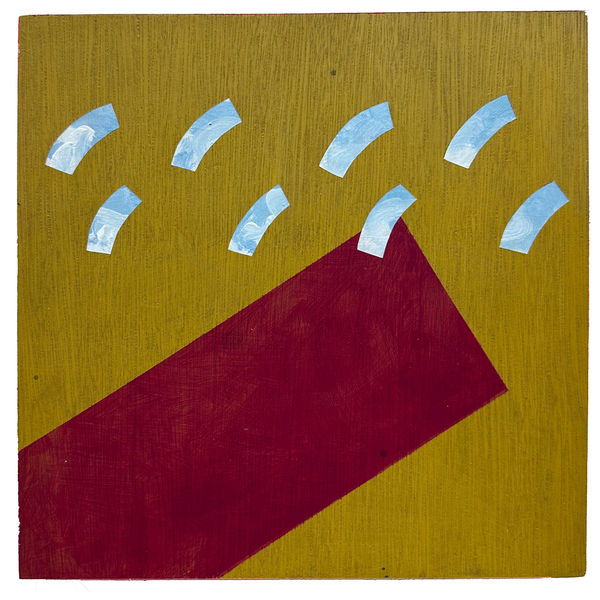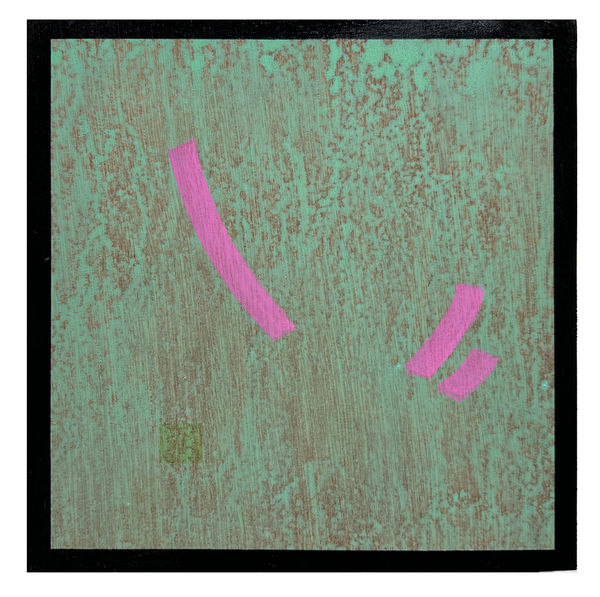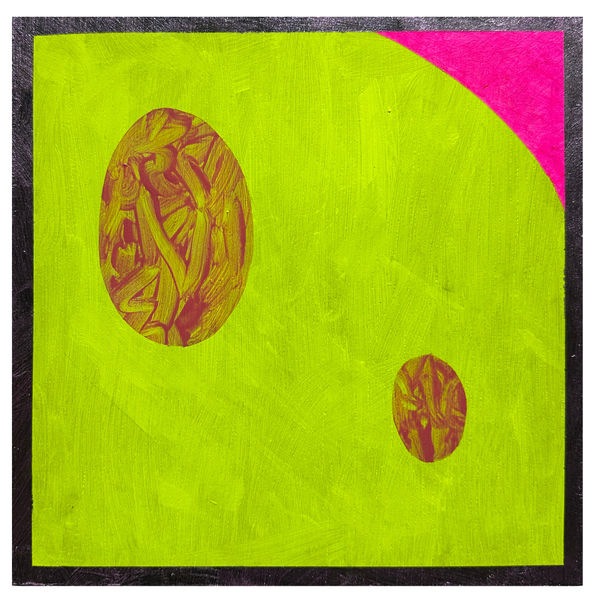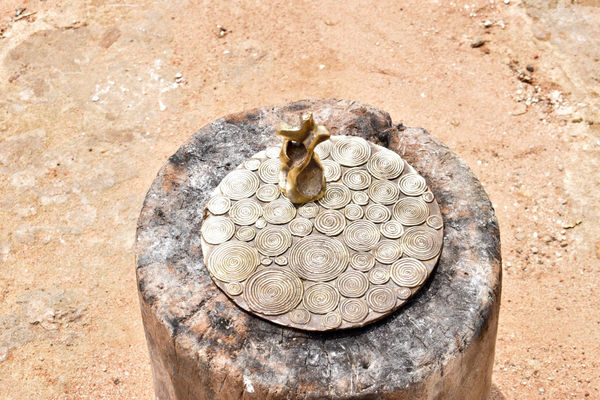Mining Abstractions
Lani Adeoye
Chijioke Anyacho
Jelili Atiku
Kingsley Ayogu
Adébayo Bolaji
Layo Bright
Chukwuemeka Anthony Chukwu
Yagazie Emezi
Diana Ejaita
Modupeola Fadugba
Bisila Noha
Ozioma Onuzulike
Araba Opoku
Sabastine Ugwuoke
Opening Reception: Thursday, April 24 | 6-8 PM
kó is pleased to present Mining Abstractions, a group exhibition that brings together artists who engage abstraction to decipher cultural codes, histories, and mythologies. Their works deconstruct systems of visual language through mark-making, pattern, repetition, and fluid structures. Working across painting, drawing, ceramics, textiles, and design, these artists approach abstraction as a practice of excavation, uncovering layered meanings and reshaping personal metaphors.
Some works unfold through delicate, meditative marks; others through bold, expressive gestures. Several artists draw from inherited traditions—Yoruba cosmology, Igbo Uli design, ceremonial symbols, and craft practices—infusing abstraction with cultural memory and ancestral knowledge. Others respond to the conditions of contemporary life, shaped by digital culture, diasporic movement, and the politics of visibility. Motifs such as webs, networks, and fragmented bodies evoke themes of restriction, transition, and passage. In other works, abstraction becomes a way of mapping psychological and spiritual landscapes, reflecting on legacy, loss, and transformation.
Together, these artists expand the language of abstraction—at once personal and collective, historical and contemporary, visible and obscured. Through their material gestures, they engage reshape narratives of continuity and change.
This exhibition features Lani Adeoye, Chijioke Anyacho, Jelili Atiku, Kingsley Ayogu, Adébayo Bolaji, Layo Bright, Chukwuemeka Anthony Chukwu, Yagazie Emezi, Diana Ejaita, Modupeola Fadugba, Bisila Noha, Ozioma Onuzulike, Araba Opoku, and Sabastine Ugwuoke.
This exhibition is proudly sponsored by Le Connoisseur.
-
 Chukwuemeka Anthony Chukwu, Precipitate Control, 2025
Chukwuemeka Anthony Chukwu, Precipitate Control, 2025 -
 Chukwuemeka Anthony Chukwu, Fragment Painting I, 2025
Chukwuemeka Anthony Chukwu, Fragment Painting I, 2025 -
 Chukwuemeka Anthony Chukwu, Fragment Painting II, 2025
Chukwuemeka Anthony Chukwu, Fragment Painting II, 2025 -
 Chukwuemeka Anthony Chukwu, Fragment Painting III, 2025
Chukwuemeka Anthony Chukwu, Fragment Painting III, 2025
-
 Chukwuemeka Anthony Chukwu, Fragment Painting IV, 2025
Chukwuemeka Anthony Chukwu, Fragment Painting IV, 2025 -
 Chukwuemeka Anthony Chukwu, Fragment Painting V, 2025
Chukwuemeka Anthony Chukwu, Fragment Painting V, 2025 -
 Chukwuemeka Anthony Chukwu, Before sundown, 2025
Chukwuemeka Anthony Chukwu, Before sundown, 2025 -
 Chijioke Anyacho, As it above, so is below (Quod Superius, Sic Inferius), 2025
Chijioke Anyacho, As it above, so is below (Quod Superius, Sic Inferius), 2025
-
 Chijioke Anyacho, Wake me up when its all over (sleep as a catharsis), 2025
Chijioke Anyacho, Wake me up when its all over (sleep as a catharsis), 2025 -
 Chijioke Anyacho, If my father's hands were tied, my hands cannot be tied, 2025
Chijioke Anyacho, If my father's hands were tied, my hands cannot be tied, 2025 -
 Araba Opoku, There are cathedrals everywhere for those who have eyes to see, 2025
Araba Opoku, There are cathedrals everywhere for those who have eyes to see, 2025 -
 Adébayo Bolaji, In the Beginning , 2024
Adébayo Bolaji, In the Beginning , 2024
-
 Adébayo Bolaji, The Season in Between a Learning Period, 2022
Adébayo Bolaji, The Season in Between a Learning Period, 2022 -
 Yagazie Emezi, You have this much time, 2024
Yagazie Emezi, You have this much time, 2024 -
 Yagazie Emezi, Untitled, 2024
Yagazie Emezi, Untitled, 2024 -
 Yagazie Emezi, Breathwork, 2024
Yagazie Emezi, Breathwork, 2024
-
 Yagazie Emezie, Homecoming, 2024
Yagazie Emezie, Homecoming, 2024 -
 Layo Bright, Double Standard, 2022
Layo Bright, Double Standard, 2022 -
 Diana Ejaita, Ona I, 2025
Diana Ejaita, Ona I, 2025 -
 Diana Ejaita, Ona II , 2025
Diana Ejaita, Ona II , 2025
-
 Kingsley Ayogu, When gun power fails II, 2024
Kingsley Ayogu, When gun power fails II, 2024 -
 Kingsley Ayogu, When gun power fails, 2024
Kingsley Ayogu, When gun power fails, 2024 -
 Lani Adeoye, Igbako, 2023
Lani Adeoye, Igbako, 2023 -
 Modupeola Fadugba, Obátọ́ lá , 2025
Modupeola Fadugba, Obátọ́ lá , 2025
-
 Ozioma Onuzulike, Flamboyant Armour for Femi Fala III (Lace series), 2025
Ozioma Onuzulike, Flamboyant Armour for Femi Fala III (Lace series), 2025 -
 Ozioma Onuzulike, Royal Kente Weave V, 2025
Ozioma Onuzulike, Royal Kente Weave V, 2025 -
 Sabastine Ugwuoke, Kpakpando vi, 2023
Sabastine Ugwuoke, Kpakpando vi, 2023 -
 Jelili Atiku, We Slipped There, We are Feeling Here, 2023
Jelili Atiku, We Slipped There, We are Feeling Here, 2023


































































